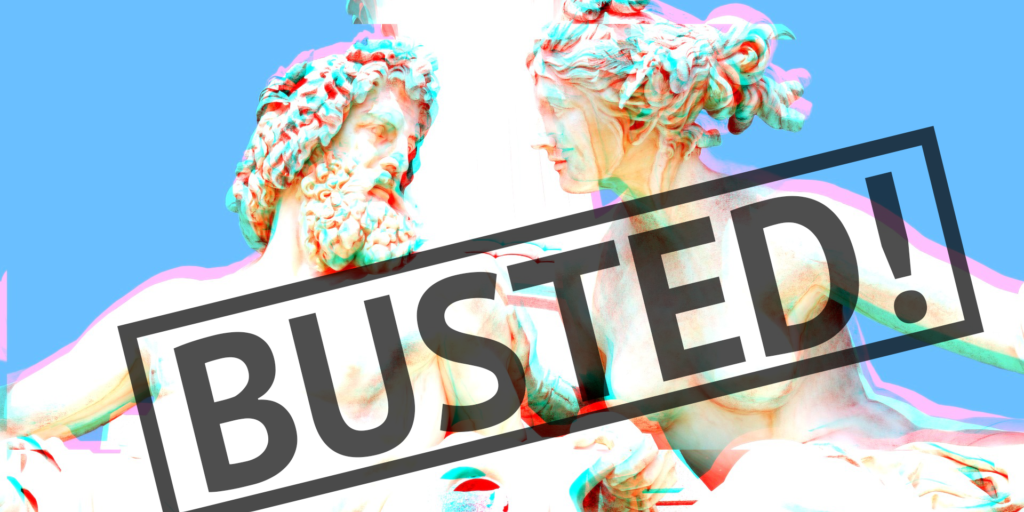Unsere vernetzte Welt verstehen

Stimmt’s? 50 Internetmythen auf dem Prüfstand
Ja, Gesetze gelten auch online. Nein, Kriminelle bleiben nicht alle unbestraft. Und nein, die Privatsphäre ist nicht tot – noch nicht. Während das Internet Governance Forum (IGF) 2019 vor der Türe steht, werde Matthias C. Kettemann (HIIG und Leibniz-Institut für Medienforschung | Hans-Bredow-Institut (HBI)) und Stephan Dreyer (HBI) pünktlich zum IGF ein Buch herausgeben, in dem sie den 50 häufigsten Internet-Mythen auf den Grund gehen. In den kommenden Wochen werden wir hier auf unserem Blog einige der Mythen als Sneak Preview vorstellen.
Was the moon landing a fake? Is the Earth flat? Are vaccines bad? No, no – and no, but these myths you encounter on the Internet are not the myths we find interesting. We are debunking actual myths – cultural constructions appearing to consist of universal truths embedded in common sense, as Roland Barthes, would put it – related to the technological and normative structure of the Internet.
These are the myths we are looking at
It is a myth, for instance, that what people do on the Internet cannot be regulated. It is a myth that protocols do not have politics. These powerful constructions of reality mystify the actual challenges in regulating the Internet. While containing some truth (it is often more difficult to regulate online behaviour than offline activities, and protocols have fewer ‘politics’ than laws, which are distilled politics), they obfuscate what is actually at stake. This is the very reason that there are forces within the Internet policy field that have a vested interest in promulgating myths. The monsters of bad policy lurk in the shadows of myths about the way the Internet is being run. They feast and grow on disinformation, misinformation and the uncritical belief in stories we tell ourselves to make sense of the world(s) we construct for ourselves to make sense of the space we inhabit.
Psychologically, myths are attractive because they seem intuitive. Myths sound like helpful simplifications in ever more complex times. They suggest that we can stop reflecting, stop questioning the status quo, stop thinking of how to improve what we perceive. If algorithms are always neutral, then we do not need to develop normative tools to hold the companies accountable that develop and deploy them. Not thinking, not questioning, not looking at detail is always easier than the opposite.
Myths are seductive
Myths are seductive. Cybercriminals go free sounds like something we may have read, something that we may have heard even politicians say. But do they? Or does the myth hide the uncomfortable truth that they do not and that it takes hard forensically sound policing to counter them, rather than political posturing?
If search engines provide objective results, then there is no pressing need to open up a societal discourse on the duties of those structuring information. If privacy is dead, then why get riled up about privacy violations? If algorithms are neutral, then biases are an issue of the past.
Myths are like heuristics to help simplify the world. Like many heuristics myths may be useful, partially true or even be based on or encompass dearly held beliefs. In terms of economy of thought myths may make sense individually. Thinking is hard, critical thinking even more so. But societally, myths are very dangerous.
Many who use myths do so consciously. “Myth has the task”, as Barthes wrote, “of giving a historical intention a natural justification and making contingency appear eternal”. But each normative solution to a specific problem of Internet politics, policy and the global Internet polity is highly contingent. If we mystify the origins of the Internet, the role of algorithms, the character of code, the normativity of rules, the pluralism in cultures and concepts of life, we lose track of historical contingencies, cultural dependencies, the conditions of social interrelationships.
A vademecum for the internet
It is against this background that we decided to publish a call for Internet-related myths. We collected submissions and in a peer-reviewed process selected the 50 most representative ones. We are fully aware that the myths we selected only represent a fraction of the myths present in Internet governance discourses, but, we submit, it is a rather representative fraction that does cover many of the key themes and all of the broad thematic issues of the Internet Governance Forum in Berlin 2019, the occasion at which this book is published.
As Vint Cerf, one of the “fathers of the Internet” writes in his introduction, “it is important to examine assertions made about the Internet and its applications both to clarify misunderstandings and to understand how some of these misrepresentations come about.” What we believe tells us not so much about the object of our (mis)understanding, but a lot about ourselves. The way we construct meaning is conditioned by our prejudices and biases and premised upon shared images and imageries, stories and narratives, metaphors and myths. “Everyone who works with these metaphors, images and narratives has a great responsibility”, Wolfgang Schulz, Director of two key research institutes on Internet research, law and policy, and one of Germany’s leading voices on media governance, reminds us: “This is also and especially true for academia. It is not enough to carry out individual studies that refute [myths]. These concepts must also be conveyable in such a way that they can be connected to social discourse.”
Our goal was to provide a vademecum for this engagement with social discourse, to rationalize the discussion on foundations and the future of the Internet and to shatter commonly held assumptions, when they are wrong. This is why the book’s global reach was important to us. Written in English it contains summaries of all myths and their short demystifications in Arabic, Chinese, French, German, Russian and Spanish. The texts will also be available online at internetmyths.eu (site currently under construction), together with a complete German version at internetmythen.de.
Sponsored by the Federal Ministry for Economic Affairs and Energy, the book will be handed out as the main giveaway to all participants of the IGF in Berlin in November 2019. It was therefore a logical choice to have Wolfgang Kleinwächter, one of Germany’s most experienced Internet governance scholars, conclude the book with a final myth: the IGF may be a ‘talking shop’, but it is one we need for sustainable Internet governance in the age of cyber-interdependence.
Dieser Beitrag spiegelt die Meinung der Autorinnen und Autoren und weder notwendigerweise noch ausschließlich die Meinung des Institutes wider. Für mehr Informationen zu den Inhalten dieser Beiträge und den assoziierten Forschungsprojekten kontaktieren Sie bitte info@hiig.de

Jetzt anmelden und die neuesten Blogartikel einmal im Monat per Newsletter erhalten.
Plattform Governance
Freundlich, aber distanziert: Die unbeabsichtigten Folgen KI-generierter E-Mails
KI-generierte E-Mails sparen Mitarbeitenden Zeit und erleichtern den Arbeitsalltag. Aber verlieren wir dadurch unsere Kommunikationsfähigkeiten?
KI am Mikrofon: Die Stimme der Zukunft?
Von synthetischen Stimmen bis hin zu automatisch erstellten Podcast-Folgen – KI am Mikrofon revolutioniert die Produktion digitaler Audioinhalte.
Haben Community Notes eine Parteipräferenz?
Dieser Artikel analysiert, ob Community Notes Desinformation eindämmen oder ob ihre Verteilung und Bewertung politische Tendenzen widerspiegeln.



